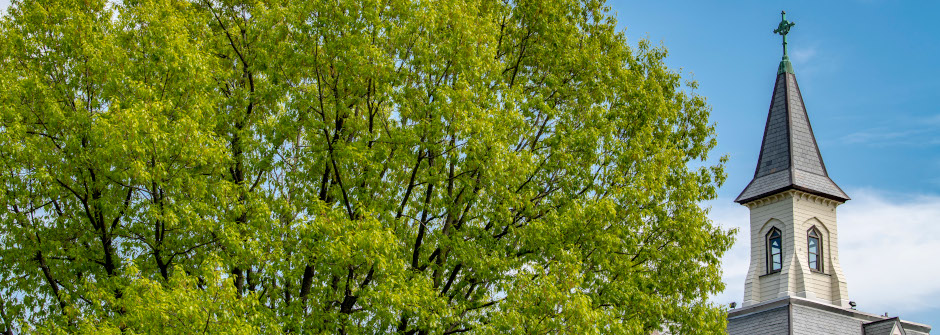
University Environmental Sustainability Committee
The University Environmental Sustainability Committee is committed to environmental stewardship, drawing inspiration from the teachings of Pope Francis and the Catholic faith. Their mission is grounded in the belief that they are called to be responsible stewards of creation, as expressed in the Book of Genesis (1:1-31) and Catholic Social Teachings.
Mission
In 2015, Pope Francis released Laudato Si', calling on humanity to protect our common home and pursue sustainable development. The Seton Hall community, as represented by the University Environmental Sustainability Committee, embraces Pope Francis' Action Plan, which comprises seven fundamental goals:
- Responding to the Cry of the Earth
- Responding to the Cry of the Poor
- Fostering Ecological Economics
- Adopting a Sustainable Lifestyle
- Offering Ecological Education
- Developing Ecological Spirituality
- Supporting Local Communities
These goals are deeply interwoven with Seton Hall's Catholic mission and dedication to environmental sustainability. Seton Hall has made a commitment to enhancing sustainability and energy efficiency, as delineated in Goal 5.1 of the University's strategic plan, "Harvest Our Treasures." Moreover, Seton Hall has pledged to support Pope Francis' 7-Year Journey Towards Integral Ecology.
Our Faith in Action
The Book of Genesis reminds us that God made the heavens and the earth (1:1-31) and that humans are commanded to care for God’s creation (2:15). Catholic Social Teachings call on all of us to show respect for God by being good stewards of creation as a requirement of our faith. In 2015, Pope Francis echoed the voices of those who came before him in Laudato Si′, reminding all of us of our responsibility to care for our common home:
The urgent challenge to protect our common home includes a concern to bring the whole human family together to seek a sustainable and integral development, for we know that things can change. The Creator does not abandon us; he never forsakes his loving plan or repents of having created us. Humanity still has the ability to work together in building our common home. (13)
On October 4, 2023, eight years since the publication of the aforementioned Encyclical Letter, the Holy Father Pope Francis reiterated his concerns about the care of our common home in the publication of Laudate Deum. His words strenuously encourage us:
I cannot fail in this regard to remind the Catholic faithful of the motivations born of their faith. I encourage my brothers and sisters of other religions to do the same, since we know that authentic faith not only gives strength to the human heart, but also transforms life, transfigures our goals and sheds light on our relationship to others and with creation as a whole. … Jesus was able to invite others to be attentive to the beauty that there is in the world because he himself was in constant touch with nature, lending it an attraction full of fondness and wonder. (61,64)
Charge
The committee's foremost responsibility is to comprehensively understand and assess the effectiveness of the University's existing environmental sustainability plans and initiatives. Additionally, they identify external resources to support these efforts and assist the University in prioritizing external funding sources. The committee also plays a pivotal role in providing education to the University community and advocating for initiatives that promote sustainability.
The committee is deeply committed to shared governance principles and seeks approval and support from the appropriate University authorities for any University-wide initiatives.
Commitment
As members of the University Environmental Sustainability Committee, they understand the profound connection between their work, Seton Hall's Catholic mission, and their collective duty to be responsible stewards of God's creation. Their work is characterized by its comprehensiveness, integration, and holistic approach, fostering active participation across the University.
Committee members remain vigilant about University, local, state, and federal environmental sustainability initiatives and align their efforts with Pope Francis' seven-goal Action Plan. They convene regularly to fulfill their mission and work closely with Mission and Ministry and University Relations to communicate their progress to the University community.
Membership
The committee is comprised of dedicated members of the Seton Hall community, carefully selected for their expertise and passion for environmental sustainability:
Co-Chairs:
- Victoria Pivovarnick, Associate Vice President, Facilities Engineering and Business Affairs
- Rev. Roberto Ortiz, S.T.L., S.T.D., Director of Liturgy and Adjunct Professor of Systematic Theology
Members:
- Father Colin Kay, Vice President for Mission and Ministry
- Kristi Stinson, Ph.D., Dean of College of Nursing
- Representative of the Priest Community: Father Nicholas Sertich, Director of Campus Ministry
- Three Representatives from the Faculty:
- Angela Carmella, J.D Law
- Thomas Rzeznik, Ph.D., History
- Kelly Shea, Ph.D., English
- Two Representatives from the Student Government Association:
- Aditya Kasina, SGA Committee Chair of Environmental Protection & Conservation Commission
- Shayne K Simmons, dual-degree student
- One Representative from Student Services: Andrew Minegar, Senior Director, Operations
- One Representative from the Division of Administration: Kristy E. Gonzalez, Assistant Vice President for Administration
- One Representative from University Advancement: Mary Jean King, Associate Vice President for Advancement Services
- One Representative from the Division of Finance: Sandra Henao, Associate Vice President for Finance
-
One Representative from the Division of University Relations: Matthew Borowick, Vice President
Collectively, the committee is committed to advancing environmental sustainability at Seton Hall University and contributing to a brighter, more sustainable future for all.
